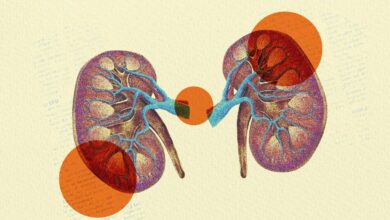
How Does a Heart Attack Feel Like: Unveiling the Sensations
A heart attack feels like severe chest pain or discomfort that may spread to other areas of the body. The pain is usually described as a squeezing or pressing sensation in the chest.
It may also be accompanied by shortness of breath, sweating, nausea, and lightheadedness. Heart attacks can vary in intensity and symptoms from person to person, but the common factor is the intense chest pain. It is important to take immediate action if you or someone else experiences these symptoms, as a heart attack is a medical emergency.
We will explore the signs, symptoms, and risk factors of a heart attack, as well as discuss the importance of seeking prompt medical attention and steps to prevent heart disease. Remember, being aware of the signs of a heart attack can save lives, so it’s crucial to learn more about this serious condition.
Recognizing A Heart Attack
A heart attack can be a life-threatening medical emergency. The key to survival relies on quick recognition and immediate medical intervention. Understanding the signs and symptoms of a heart attack is crucial for prompt action. In this section, we will discuss the common indications of a heart attack, such as chest pain and shortness of breath.
Chest Pain
Chest pain is one of the most recognizable and prominent signs of a heart attack. The sensation of chest pain during a heart attack can vary from person to person, but it is often described as a feeling of tightness, pressure, or squeezing in the chest area. Some individuals may experience intense discomfort, while others may feel a mild ache.
It is important to note that not all chest pain indicates a heart attack. However, if the pain is persistent, radiates to the jaw or arm, and is accompanied by shortness of breath or nausea, it could be a sign of a heart problem.
Shortness Of Breath
Shortness of breath is another common symptom that can occur during a heart attack. It may manifest as difficulty breathing or the feeling of being unable to catch one’s breath. Some individuals may feel a tightness in their chest, as if their breathing is constrained or restricted.
Shortness of breath during a heart attack is caused by reduced blood flow to the heart, which can lead to fluid accumulation in the lungs. This can result in a sensation of breathlessness and the need for rapid, shallow breaths.
If you or someone around you experiences sudden and unexplained shortness of breath, along with other heart attack symptoms, it is crucial to seek immediate medical attention.
Associated Symptoms
When experiencing a heart attack, there are various associated symptoms that can manifest. It’s crucial to be aware of these signs, as they can help in identifying and seeking prompt medical attention.
Nausea And Vomiting
Nausea and vomiting are commonly experienced during a heart attack. Individuals may feel nauseous and may also vomit, which can be a result of the body’s response to the heart muscle not receiving enough oxygen.
Dizziness
Dizziness is another symptom that may accompany a heart attack. The lack of proper blood flow to the brain can lead to dizziness, light-headedness, or even fainting in some cases.
Sweating
During a heart attack, sweating can occur profusely and may often be accompanied by cold, clammy skin. This is the body’s way of reacting to the extreme stress and pressure it is under.
Fatigue
Fatigue is a common symptom that can occur before or during a heart attack. Individuals may experience extreme tiredness and weakness, often without any apparent reason.
Atypical Symptoms
Atypical Symptoms:
Back Pain
While chest pain is common, back pain can also signal a heart attack. It may feel like a squeezing pressure. Do not ignore persistent back pain.
Pain In The Arm Or Jaw
Heart attack symptoms may include pain or discomfort in the arm or jaw. This is more common in men than women.
Indigestion
Sometimes, a heart attack can feel like indigestion. If you experience unusual stomach discomfort along with other symptoms, seek medical help.

Credit: www.npr.org
Warning Signs In Women
When it comes to heart attacks, warning signs in women may differ from those experienced by men. It’s essential for women to recognize these signs to seek prompt medical attention.
Unusual Fatigue
Unusual fatigue is a common warning sign of a heart attack in women. Such fatigue may not be relieved by rest and can occur suddenly.
Discomfort In The Center Of The Chest
Discomfort in the center of the chest is another significant warning sign. Women may feel pressure, pain, or tightness in the chest that can come and go.
What To Do During A Heart Attack
A heart attack can be a frightening and life-threatening experience, so it’s crucial to know what to do during one. Recognizing the symptoms and taking immediate action can make a significant difference in the outcome. Here’s what you should do if you suspect you or someone else is having a heart attack.
Call Emergency Services
Immediately dial your local emergency services number (e.g. 911 in the United States) as soon as you suspect a heart attack. Time is of the essence, and calling for help promptly can save a life. Make sure to provide the dispatcher with all relevant information, such as the person’s symptoms and current location.
Take Aspirin If Recommended By A Doctor
If you have been previously advised by a doctor to take aspirin during a potential heart attack, chew a regular, non-coated aspirin while waiting for emergency services to arrive. This can help to prevent further blood clotting and minimize the severity of the heart attack.
Frequently Asked Questions On How Does A Heart Attack Feel Like
How Do I Know If I’m Having A Heart Attack?
Signs of a heart attack include chest pain or discomfort that spreads to the arms, back, neck, jaw, or stomach. You may also experience shortness of breath, nausea, or lightheadedness. If you suspect a heart attack, call emergency services immediately.
Seek medical attention to confirm and receive appropriate treatment.
What Does A Minor Heart Attack Feel Like?
A minor heart attack may cause chest pain, discomfort, or pressure that lasts for a few minutes. Other symptoms include shortness of breath, fatigue, and nausea. It’s important to seek medical attention immediately if you experience these signs to prevent a major heart attack.
How Can You Rule Out A Heart Attack At Home?
To rule out a heart attack at home, call emergency services. Monitor symptoms and take an aspirin if advised. Stay calm and avoid physical exertion. Once medical help arrives, follow their instructions and provide details of the symptoms you observed.
How Long Do Heart Attacks Last?
Heart attacks vary in duration but typically last from 30 minutes to several hours. Seek immediate medical help if you suspect a heart attack.
Conclusion
Recognizing the signs of a heart attack is crucial for prompt medical attention. Listening to your body, seeking immediate help, and understanding symptoms can make a life-saving difference. Knowing how a heart attack feels like could be the key to saving your life or someone else’s.
Don’t ignore the signs; take action.




